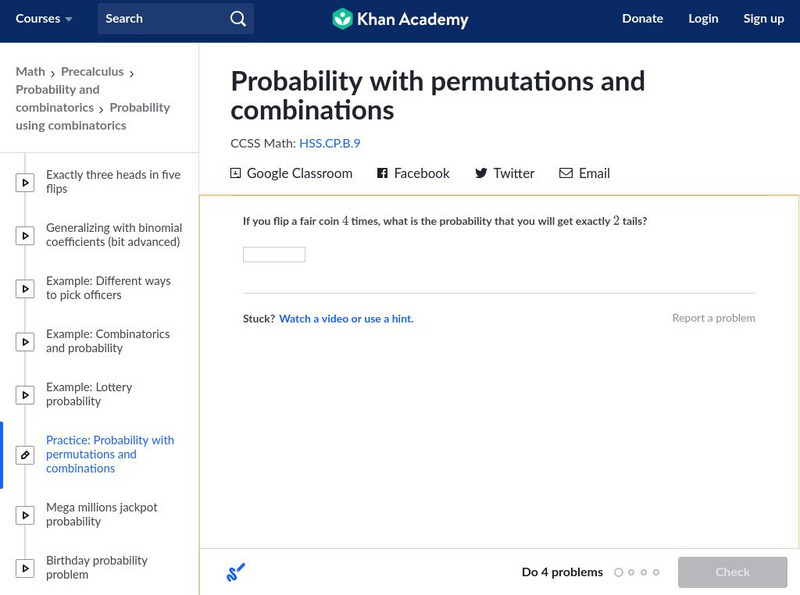Mathalicious
Three Shots
To foul or not to foul, that is the basketball question. High schoolers look at the probability that fouling out a player and allowing free throws yields a better outcome than allowing the original shot. The resource provides a...
Shodor Education Foundation
Spread of Disease
Control the spread of a contagious disease. An applet allows pupils to run a simulation on the spread of a disease. Rules govern how the disease is spread and the length of time it takes to recover. Learners view the spread visually and...
Shodor Education Foundation
Marbles
Grab some marbles from a bag. The applet simulates drawing marbles from a bag. Pupils determine the number of four colors of marbles in a bag and how many marbles to draw. Using information on whether order matters in the draw and if...
Shodor Education Foundation
Crazy Choices Game
Wanna take a chance on which game is best? The resource provides three games of chance using multiple types of games. Games range from coin toss to cards. Choosing a type of game, pupils determine what wins and enter the theoretical...
Shodor Education Foundation
Experimental Probability
Spin into a dicey experiment. Pupils use a spinner or a pair of dice to determine the experimental probabilities of each outcome. The interactive allows for either, one, five, or ten consecutive experiments. Using the applet, learners...
Curated OER
Changing It Up
How should a cashier stock a cash register with coins? Learners use mathematical modeling and expected value to determine how many rolls of coins of each type they should place in a cash register.
Curated OER
Pi Day: The Other Math Holiday!
Happy Pi Day! This collection of games, experiments, and activities leads participants through an exploration of the many aspects and attributes of that mysterious quantity, pi. Activities range from using statistical...
Curated OER
Flipping for a Grade
What happens when your teachers get tired of grading tests and want to use games of chance to determine your grade? How would you decide which game they should play? Learn how to use expected value and standard notation to compare two...
Northern Illinois University
The Mathematical Atlas: Probability Theory and Stocha
This site from the Northern Illinois University gives general background information on probability and also includes books and other websites that contain information on Probability.
Yale University
Yale New Haven Teachers Institute: Introduction to Mathematical Probability
This site gives an overview of probability, including example problems and a reading list. Exhaustive and detailed, this should help dramatically with students looking to study probability.
Khan Academy
Khan Academy: Probability and Combinatorics: Permutations
Introductory permutation problems. Students receive immediate feedback and have the opportunity to try questions repeatedly, watch a video or receive hints.
Khan Academy
Khan Academy: Probability With Permutations and Combinations
Probability questions using permutations and combinations of objects. Students receive immediate feedback and have the opportunity to try questions repeatedly, watch a video or receive hints.
Khan Academy
Khan Academy: Dependent Probability
Find dependent probabilities like P(A | B) or P(B | A) for a variety of contexts. Students receive immediate feedback and have the opportunity to try questions repeatedly, watch a video or receive hints.
Mathigon
Mathigon: Probability and Discrete Math: Predicting the Future
This lesson focuses on probability theory for predicting the outcome of flipping a coin, and then flipping it multiple times.
Mathigon
Mathigon: Probability and Discrete Math: Casino Mathematics
This lesson focuses on the probability and casino games such as Roulette which consists of a wheel with the numbers from 1 to 36 colored in red and black, as well as a green 0. A ball rolls around the outside and randomly lands on one of...
Shodor Education Foundation
Shodor Interactivate: Crazy Choices Game
Compare theoretical and experimental probabilities, using dice, cards, spinners, or coin tosses. Three different probabilities can be compared at once.













